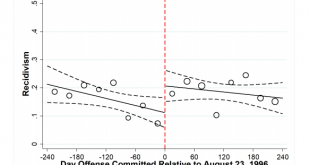I spoke first to Eric Rubin, a career diplomat since 1985 at the State Department, a former U.S. ambassador to Bulgaria, and currently president of the American Foreign Service Association. He is crystal clear that “you cannot speak publicly against government policy. If you want to do that, you must resign. It’s anti-democratic. It is inappropriate to believe you know better than the people’s elected representatives.” Rubin also believes that resignations rarely have any impact on policy....
Read More »Benefit-Cost Analysis and the Coronavirus — Peter Dorman
A little philosophy (value theory) today. Personally, I think it would be madness to stick a monetary value on people’s lives and base our policy choices on whether the dollars on one side of the ledger outweigh those on the other. I wrote a book about that a while ago. The considerations that lead us to think primarily in public health terms at a time like this apply just as well to other issues, from food safety to climate change. The economists who crank out monetary values of life...
Read More »IPA’s weekly links
A slope even non-economists can loveGuest post by Jeff Mosenkis of Innovations for Poverty Action First, please pass along to your skiing friends that the owner of the ski treehouse above in Whitefish, MT (Glacier National Park adjacent) is offering to donate proceeds to the non-profit I work for, IPA, from any rentals between now and Jan 31. (Instructions here)Among other things, IPA’s been investing in expanding the things that academics don’t always have incentives to do, hiring Ph.D.s...
Read More »Can Ethics Be Taught? — Peter Singer
On a range of ethical issues, philosophy professors specializing in ethics have been found to behave no better than professors working in other areas of philosophy, or than non-philosophy professors. But that doesn't necessarily mean that ethical reasoning is powerless to make people behave more ethically.… One problem in teaching philosophy is that people are seeking pat answers as it math and science. Life is not cut and dried like that. Most areas are gray, and thus the ongoing...
Read More »IPA’s weekly links
Guest post by Jeff Mosenkis of Innovations for Poverty Action India’s government is hiring behavioral scientists for a new nudge unit (h/t Neela Saldanha)Cancer researcher Peter Bach points out how Novartis used anchoring to set price expectations high for a new immunotherapy, making a 2 million dollar drug price (much higher than other life-saving treatments) sound reasonable years in advance by consistently referring to the new treatments in development as “million dollar therapies.” In...
Read More »IPA’s weekly links
Photo via US Census BureauGuest post by Jeff Mosenkis of Innovations for Poverty Action The Development Impact Blog has a very nice series of job market papers Is microcredit for the poor good, bad, or neither? Maybe good for some, but bad for others – if so how can we predict whom it’ll help and whom it’ll hurt to target it better? Tim Ogden’s going to be hosting a webinar next Friday Dec. 7th, with Lauren Falcao Bergquist, Cynthia Kinnan, Karthik Muralidharan and Bruce Wydick to hash it...
Read More »Massimo Pigliucci — Human Nature and the Ethical Life
Philosophers have been debating human nature for centuries, but in an era of increasing political vitriol and partisanship, the issues at stake are gaining new relevance. To understand what we should expect from our leaders, we must first consider what to expect of ourselves. The fact that is is appearing at Project Syndicate is an indication of recognition that the enduring question, What does it means to live a good life in a good society, continues to have relevance in practical affairs,...
Read More »Paul Robinson — Stubborn resistance
More on just war theory and liberal interventionism. This is philosophy as critical thinking applied practically, i.e., applied philosophy. I largely agree with Robinson's analysis. What he omits, and which I take to be crucial, is that the argument in the abstract ignores the relevance of interference to further policy, which involves the interests and policy goals of the interferer. This creates a conflict of interest, since it is not a disinterested action any longer but an...
Read More »Toni Airaksine — Prof blames mathematics for ‘global disparities in wealth
First, Ernest asserts that “the nature of pure of mathematics itself leads to styles of thinking that can be damaging when applied beyond mathematics to social and human issues,” since math facilitates “detached” and “calculative” reasoning.... Second, he argues that the “applications of mathematics in society can be deleterious to our humanity unless very carefully monitored and checked,” worrying particularly about how math facilitates transactions of money and finance....Finally, Ernest...
Read More »IPA’s weekly links
Guest post by Jeff Mosenkis of Innovations for Poverty Action. Penny Goldberg of Yale will be the new World Bank Chief Economist, she and Nina Pavcnik wrote about their work on why opening up trade helped developing countries grow at VoxDev. An update on last week’s discussion of GiveDirectly’s 3-year effects findings (if you need a catch-up, see Justin Sandefur’s post which is also valuable for the review of other recent research at the end). The questions focused on what we can say on...
Read More » Heterodox
Heterodox


